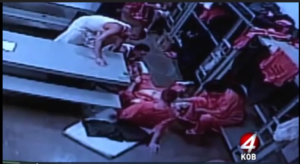In April of 2012 a twenty four year old man lost his life while in the care of the Department of Corrections. His name was Ricky D. Martin. Some might say he was still a boy, although he was the father of two.
According to Julie Brown with the Miami Harold, Martin had a rough start in the world. His parents were murdered when he was two years old, and he and his sister were sent to live with their grandparents in another state – Florida.
Ricky was a bit on the small side all his life and had a hard time fitting in. He was an easy target for the neighborhood bullies, and he turned to the wrong crowd looking for protection and got involved in gangs. According to the Harold, he was in special education, and his academic performance was three years below his age. He couldn’t compete in the job market when it came time for him to start earning an income, and he sometimes turned to stealing and reckless behavior to pay the rent.
The chips were stacked against him from the very beginning. Having your parents murdered would be devastating, living with a learning disability is a struggle, being the victim of bullying is life changing – Ricky had all those things to contend with.
He was arrested nine times as a juvenile, mostly for burglary, grand theft and larceny, and also was charged with assault on a juvenile probation officer three times, according to the Harold. His final arrest was for grand theft and armed burglary. He broke into a home when no one was there and stole guns. He later sold them. In Florida, ‘stealing a weapon’ is classified as armed robbery.
While incarcerated Mr. Martin received 32 disciplinary reports, the majority of which involved cutting and tattooing himself and disorderly conduct. There was also an incident with a fight and spoken threats. Early in his incarceration, he gravitated towards gang members as a means of survival and for protection, but when he later tried to distance himself from that life, he became a target. He also felt he was the target of staff members after reporting that officers were running a fight club.
According to the Harold, he would do what he could to stay in trouble after that in order to keep himself in segregation, which often meant cutting himself. He even wrote to the administration, telling them he feared for his life. As written in Ricky’s slightly shaky handwriting in a grievance to the Department of Corrections, dated November 18, 2011:
I’m filing this grievance cause I feel that my life is in Jeopardy. In May 2010 I was transferred in middle of the night from North West Florida Reception Center on account of me telling on Officer Sittenberry about having a fight club in food services. Well now I’m being housed at Holmes C.I. and there are several officers here that came from North West Florida Reception Center, such as Mrs. Rock, Sgt. Newberry, Mr. Meeks, Mrs. Jackson and the Warden. They told me that I was a snitch and told inmates about the incedent. Now I have inmates and officers after me. I can’t check in cause officer will play with my food. I’m in confinement at this time cause a officer set me up with a knife and the officers play with my mail, food, and religious material. I’m trying to catch more Dr’s while I’m in confinement cause I’m safer in here. I’m asking for help. Please take this matter seriously cause my life is on the line. I was transferred here to protect myself but this camp is to close to NWFRC. So please look in to this, and handle it wisingly. Thank you.
On December 11, 2011, this response was issued:
Your request for administrative appeal is in non-compliance with the Rules of the Department of Corrections, Chapter 11-103, Inmate Grievance Procedure. The rule requires that you first submit your appeal to the appropriate level at the institution. You have not done so or you have not provided this office with a copy of that appeal, nor have you provided a valid or acceptable reason for not following the rules.
Furthermore, if you fear staff, you need to file an informal grievance to the Colonel. The Colonel should have the opportunity to address these issues regarding staff at the institution. If you fear another inmate, contact the shift officer in charge for immediate action.
Upon receipt of this response, if you are within the allowable time frames of processing a grievance, you may resubmit your grievance at your current location in compliance with Chapter 11-103, Inmate Grievance Procedure.
Based on the foregoing information, your grievance is returned without action.
G. Wellhausen.
A little over three months later, Ricky Martin was admitted to Santa Rosa Correctional Institution.
There was an inmate at Santa Rosa that had been there before Ricky, by the name of Shawn Rogers. As anyone in corrections knows, officers and staff get to know the inmates they house and have a feel for their demeanor and how dangerous they are. Shawn Rogers made it quite easy for staff though, as he was very vocal about his level of violence and never attempted to hide it. As the department of corrections knew, he had an extensive record behind bars.
Mr. Rogers was serving a life sentence. During his incarceration he often threatened staff. His record as of December 17, 2014 included 107 disciplinary actions while in custody, including Disrespect to Officials, Disobeying Orders, Spoken Threats, Lying to Staff, Assaults or Attempt, Failure to Comply, Lewd or Lascivious, Unarmed Assault, Disorderly Conduct, Inciting Riots, Destruction of Property, Aggravated Assault Against an Inmate, Battery Against an Inmate. I have not included all of the charges, and there were multiple incidents of the charges that I listed.
Rogers was 6’4” and weighed 260 pounds, in comparison to Ricky, who stood 5’4” and weighed 140 pounds. That, in itself, is significant, as Rogers was nearly a foot taller and weighed nearly twice as much as Ricky.
The staff at a Florida prison placed Ricky Martin in a cell with Rogers, locked the door and walked away. According to the Miami Harold, a witness in the neighboring cell said that he heard Martin ask an officer to move him. The witness also said that Martin was told by the officer to, “Fight or f….” Other inmates testified to hearing the same response from the officer.
There was racial tension at the time Ricky was placed in Rogers’ cell, and witnesses reported that earlier, Rogers had loudly said he wanted to kill a white inmate.
The Harold reported that 53 inmates provided testimony relevant to what happened to Ricky in that cell after he was locked in. When officers finally went in to check on him, he was unconscious. He was in a pool of his own blood with his hands and feet tied. He had bloody shorts on his head and fabric around his neck. As reported by Julie Brown, there were bloody handprints smeared onto the wall. His shorts were around his ankles. The 5’4” twenty four year old suffered. He endured a brutal death.
While Ricky was screaming for help, along with the inmates in the surrounding cells, there was no response. In a prison, a place that is designed for surveillance and to supervise individuals, the screaming, torture and murder took place without interference.
At 7:01 p.m. prison cameras show an officer looking inside the window to the cell shared by Ricky and Rogers. The officer kept walking. There is then a shadow of another officer walking the second floor. Then – at 7:09 a different officer looks into the cell and sees blood and Ricky’s body under a blanket. Rogers told the officer his cellmate had been cutting himself.
Upon entering the cell, Ricky Martin, who was unconscious and never woke up again, was handcuffed by staff and had leg restraints put on before he was carried to the infirmary. It was reported he was so badly beaten he was unrecognizable.
After the death of Ricky Martin, Rogers wrote a lengthy letter to the judge in the case. In it he said:
…it has been no military secret that I have been one of the most vicious and violent prisoners in the entire state of Florida. My disciplinary history reflects numerous assaults, stabbings, slashings, fights and a blatant disregard for authority of any kind.
He continued to say:
Your honor I’m pretty sure that you’ve been dealing with the department of corrections long enough to know what goes on and what type of games get played. On the day of the incident in question, I was moved out of a cell with a good cellmate that I was getting along with perfectly fine and put into a cell with Ricky D. Martin. The people in charge knew that me and Mr. Martin was going to have a serious problem. The last time I was at this institution in February, 2005, I had a similar kind of incident with an inmate named Noah Stancil. They moved him in my cell and I didn’t like him. So I knocked him out, tied him up and almost beat him to death.
He then goes on to describe the crime and asks to be put to death, expressing he felt no remorse and he would do it again if he is allowed to live.
A slight, young man with a sad youth and a learning disability was in prison for burglary, with two years to go and two children and a wife to come home to. He was locked into a cell with a man twice his size, who had stated he wanted to kill a white man, who had pages of violent behavior documented by the department of corrections. Ricky Martin died screaming and pleading for help, joining the voices of the surrounding inmates. No one in the tax funded Department of Corrections was held responsible for allowing this to happen.
REFERENCES
All the documents used in this article were obtained through Julie Brown’s, Miami Harold.com article.
![]()
 I pray that this fury I feel over that comment doesn’t ruin me. As I sit here, I think of a friend of mine that shared a story with me. He’s in prison, and he’s going to be put to death some day for his crimes. I asked him about his earliest memories. He told me what they were. I promised not to share them without his permission, and I won’t. What I will say is that his earliest memories are what nightmares are made of. He was four years old. He was just a fragile, vulnerable little boy. Things happened to him that I can’t even think about without my heart breaking. Things happened to him that no little boy should ever, ever endure. He didn’t get help though. His life didn’t get better. He had no heroes. Not one. The world is at fault for what happened to that little boy and the consequences of how that formed his reactions to events in his life.
I pray that this fury I feel over that comment doesn’t ruin me. As I sit here, I think of a friend of mine that shared a story with me. He’s in prison, and he’s going to be put to death some day for his crimes. I asked him about his earliest memories. He told me what they were. I promised not to share them without his permission, and I won’t. What I will say is that his earliest memories are what nightmares are made of. He was four years old. He was just a fragile, vulnerable little boy. Things happened to him that I can’t even think about without my heart breaking. Things happened to him that no little boy should ever, ever endure. He didn’t get help though. His life didn’t get better. He had no heroes. Not one. The world is at fault for what happened to that little boy and the consequences of how that formed his reactions to events in his life. Doug, the man who served our country in the Army, became ill. As they should have, the men living with him reported that he wasn’t feeling well.
Doug, the man who served our country in the Army, became ill. As they should have, the men living with him reported that he wasn’t feeling well. The men he lived with were much more compassionate than the staff at the Cibola County Detention Center. They not only pleaded for help for their cellmate, they also can be seen in video footage holding hands and conducting a prayer circle for him. They can be seen trying to soften his fall when he rolled from his bed. They are seen cradling his head and holding a bible. The inmates tended to Doug Edmisten with compassion and care with all they had at their disposal, which was prayer and an offer of comfort.
The men he lived with were much more compassionate than the staff at the Cibola County Detention Center. They not only pleaded for help for their cellmate, they also can be seen in video footage holding hands and conducting a prayer circle for him. They can be seen trying to soften his fall when he rolled from his bed. They are seen cradling his head and holding a bible. The inmates tended to Doug Edmisten with compassion and care with all they had at their disposal, which was prayer and an offer of comfort. We break the rules, not to be assholes that just want to get in trouble, but out of a need to be as comfortable as possible in such a lonely, cold, dark and very oppressive and restricted environment.
We break the rules, not to be assholes that just want to get in trouble, but out of a need to be as comfortable as possible in such a lonely, cold, dark and very oppressive and restricted environment. So, here’s to a new catagory on this site –Views From The Inside. This is Part One from a journal by Gerard G. Schultz, Jr., titled, Sharing My Thoughts from Inside the Cesspool of IDOC.
So, here’s to a new catagory on this site –Views From The Inside. This is Part One from a journal by Gerard G. Schultz, Jr., titled, Sharing My Thoughts from Inside the Cesspool of IDOC. “I have black out two times in less then 24 hr. I keep asking to go to the emergency room. I don’t know what cause the blankouts. I do know that my tororance are low plus I haven’t had a meal that I come eat. I can’t hold water down or food. I don’t know many emergency grievance I have written with same reply. Wait on your (me) appointment. I know about what my blackouts leading to seizure.”
“I have black out two times in less then 24 hr. I keep asking to go to the emergency room. I don’t know what cause the blankouts. I do know that my tororance are low plus I haven’t had a meal that I come eat. I can’t hold water down or food. I don’t know many emergency grievance I have written with same reply. Wait on your (me) appointment. I know about what my blackouts leading to seizure.” starting foaming at the mouth. Inmates who saw that happen tried to get help from jail staff, but were told by an officer, “I am busy right now.” The lawsuit that has been filed claims that Henry asked for help from as early as mid July, and his weight when he was received by the jail was 167 pounds, and it was 132 upon his death.
starting foaming at the mouth. Inmates who saw that happen tried to get help from jail staff, but were told by an officer, “I am busy right now.” The lawsuit that has been filed claims that Henry asked for help from as early as mid July, and his weight when he was received by the jail was 167 pounds, and it was 132 upon his death. was taken to a hospital, where he passed away on October 21, 2014. He had a mother, Christine Brooks, and a father, Robert Brison. Christine said her son was ‘sweet and humble’ and a ‘mama’s boy’. Brison grew up in St. Louis and was the father of four children, ages 4, 5, 6 and 7.
was taken to a hospital, where he passed away on October 21, 2014. He had a mother, Christine Brooks, and a father, Robert Brison. Christine said her son was ‘sweet and humble’ and a ‘mama’s boy’. Brison grew up in St. Louis and was the father of four children, ages 4, 5, 6 and 7. Our reality is a product of what we know and are permitted to know. If all the events that take place behind prison bars were brought to light, there might be a call to action from normal, everyday America.
Our reality is a product of what we know and are permitted to know. If all the events that take place behind prison bars were brought to light, there might be a call to action from normal, everyday America.